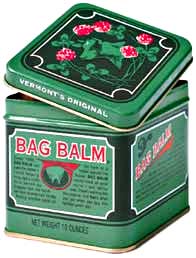David Heiller
Don’t laugh, but this column
is about Bag Balm. Bag Balm is a product that is made to eliminate chapped skin on cow teats and udders. Hence, the name.
Some people think
the name Bag Balm is udderly ridiculous. But I kind of like it. Not fancy, not
pretty, but
it fits.
According to the can, Bag Balm is made “For chapped
teats, superficial scratches, windburn, and
sunburn.”
The directions on the can say: “Massage thoroughly and
allow ointment to remain for full antiseptic and softening effect on the udder.”
At the bottom in
bold print, it says VETERINARY USE ONLY. You can ignore that line. It’s just a disclaimer in case some teenager tries
to inhale it or something.
Farmers discovered
by accident that the act of massaging a
few teats made their hands feel better. In other words, what is good for
the goose is good for the gander. Hands that were chapped and nicked up, like
all farmers hands are softened and healed from the Bag Balm.
In my case, what is good for the teat is good for the feet. That’s
where I use
Bag Balm. This time of year, wearing Sorel-type boots, my feet get dry and cracked. The heels have big canyons
in them; sometimes
it even hurts to walk. I know I’m not the only one with this problem.
When it gets real bad, I grab the can of Bag Balm from my dresser and scoop a big glob of it in my hands and
rub it into and onto both feet. It feels very soothing to both my feet and my
hands. It smells good too, which
I think is from the lanolin base.
It doesn’t soak into the skin like some of those limp-wristed hand
creams. It’s more like axel grease, something the pioneers rubbed on the hubs
of wagon wheels on the Oregon Trail. The can calls it a “stiff ointment.” That’s as good a term as
any.
Then I put on a couple a pair of old socks and sleep with them on. In
the morning, the skin on my feet actually feels like skin again, and not like
Steger mukluks. The calluses’ are almost soft to the touch.
My wife doesn’t like Bag Balm. She uses
products with names like “Avon Moisture Therapy, Moisturizing Lipid Complex.” (I
personally could never use anything with a lipid complex.)
 The main reason Cindy doesn’t like Bag Balm is that it stains the
sheets if it works through the socks, which it does if you put on a half-inch-thick
layer (like me), or if you always use a special pair of Bag Balm socks (like me).
Cindy doesn’t like that,
although stained sheets never bothered me much.
The main reason Cindy doesn’t like Bag Balm is that it stains the
sheets if it works through the socks, which it does if you put on a half-inch-thick
layer (like me), or if you always use a special pair of Bag Balm socks (like me).
Cindy doesn’t like that,
although stained sheets never bothered me much.
You can buy Bag Balm at most farm-related businesses,
like the Willow River Mercantile or Askov Co-op Feed. A 10-ounce can costs about $4.50.
You can also buy it direct from its manufαcturer, Dairy Association
Company, Inc, Lyndonville, Vermont, 05851; telephone (802) 626-3610. It comes
in three sizes: one-ounce, 10 ounce, or 4-1/2-pound can for. $34.50. That’s a lot of
teats.
The cans are
green with red
lettering. They look old fashioned and make a perfect stocking staffer for that
favorite guy of yours, or an enlightened wife.
I’m not getting a kick-back from this column,
no free can of Bag Balm. I just felt like singing the praises of something that
actually works.


